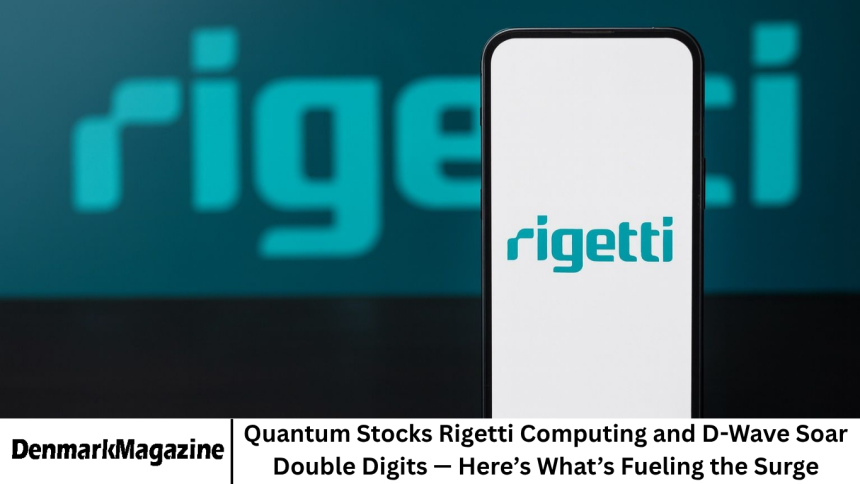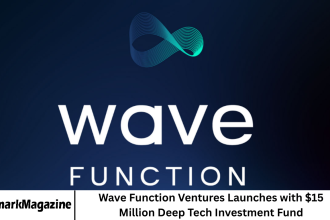Quantum computing has long been one of the most futuristic promises in technology — a field that blends physics, mathematics, and computer science to solve problems far beyond the reach of traditional computers. For years, this sector remained a niche interest among scientists and specialized investors.
- The Sudden Surge
- Understanding Quantum Computing
- Rigetti Computing: A Quiet Contender Finds Its Moment
- D-Wave Quantum: The Veteran Innovator
- The Broader Catalyst: Quantum’s Strategic Importance
- The Power of Market Sentiment
- Challenges Ahead
- Why Investors Are Still Excited
- The Road Ahead
- The Bigger Picture
- Frequently Asked Question
- Conclusion
But this week, two names from the quantum world — Rigetti Computing and D-Wave Quantum — took center stage in the stock market, each soaring by double digits and drawing massive attention from traders, analysts, and technology enthusiasts.
Their rally wasn’t just a random blip. It reflected a growing sense of momentum for quantum technology, a resurgence of investor enthusiasm, and new developments suggesting that commercialization may be closer than many once believed.
More Read: Wave Function Ventures Launches with $15 Million Deep Tech Investment Fund
The Sudden Surge
In a single week, Rigetti Computing and D-Wave Quantum became some of the fastest-rising stocks on the market. Rigetti’s shares jumped sharply, while D-Wave saw similar double-digit gains. Both moves stood out in an otherwise cautious technology market, where most investors have recently been focused on artificial intelligence and semiconductors.
This sudden spike wasn’t purely speculative. It came after a series of announcements and signals that major financial institutions, governments, and corporations are doubling down on quantum computing as a strategic technology. For years, quantum startups struggled for attention compared to AI companies.
Now, the situation appears to be shifting — and these two firms are reaping the benefits.
Understanding Quantum Computing
Before diving into why Rigetti and D-Wave are surging, it’s important to understand what quantum computing actually means.
Traditional computers process data using bits — tiny units that can represent either a 0 or a 1. Quantum computers, on the other hand, use qubits, which can represent both 0 and 1 simultaneously thanks to a quantum principle called superposition. This allows quantum computers to perform certain types of calculations exponentially faster than even the most powerful supercomputers.
Quantum computing is not meant to replace classical computing entirely. Instead, it’s designed to tackle complex problems such as:
- Molecular simulations for drug discovery
- Optimization of financial portfolios
- Logistics and supply chain optimization
- Advanced encryption and cryptography
- Artificial intelligence model acceleration
If and when quantum computing becomes commercially viable at scale, it could reshape industries from pharmaceuticals to defense. That’s the long-term vision driving investors’ excitement — and it’s starting to feel a little more real.
Rigetti Computing: A Quiet Contender Finds Its Moment
Rigetti Computing, founded in 2013 by physicist Chad Rigetti, is based in California and focuses on building superconducting quantum processors. Its goal is to develop universal quantum computers — systems that can perform a wide range of calculations and eventually achieve what’s known as quantum advantage, where quantum machines outperform classical computers at meaningful tasks.
For much of its history, Rigetti was considered the “underdog” compared to giants like IBM and Google. It went public through a SPAC merger in 2022, and its stock initially struggled, falling sharply from its debut price as investors grew skeptical of early-stage quantum firms.
But over the past year, Rigetti has staged a remarkable comeback. The company has:
- Expanded its cloud-based quantum services, allowing researchers and enterprises to access its systems online.
- Announced progress in scaling up its qubit count, moving toward processors with hundreds and eventually thousands of qubits.
- Focused on hybrid quantum-classical computing, which combines quantum processing with traditional GPUs and CPUs for practical problem solving.
- Strengthened partnerships with government and academic institutions, particularly in defense and scientific research.
These developments have given investors confidence that Rigetti is positioning itself as a serious long-term player — not just a science experiment.
D-Wave Quantum: The Veteran Innovator
If Rigetti is the ambitious upstart, D-Wave is the seasoned pioneer. Founded in 1999, D-Wave was the first company in the world to sell a commercial quantum computer. Based in Canada, D-Wave has spent over two decades developing quantum annealing machines — a specialized form of quantum computing designed for solving optimization problems.
Such as minimizing costs or maximizing efficiency in complex systems. While quantum annealing is not as versatile as the “universal quantum computing” model pursued by others, it has practical advantages. D-Wave’s systems are already being used by clients for:
- Supply-chain management
- Traffic optimization
- Machine learning model tuning
- Scheduling and logistics
Recently, D-Wave announced new upgrades to its Advantage2 system and expanded partnerships with companies in sectors like finance, aerospace, and manufacturing. Investors interpreted this as proof that D-Wave’s technology isn’t just theoretical — it’s already delivering value.
That credibility, combined with renewed excitement for the entire quantum sector, helped push D-Wave’s stock up sharply.
The Broader Catalyst: Quantum’s Strategic Importance
The rally in Rigetti and D-Wave stocks didn’t happen in isolation. Over the past few months, several large-scale developments have helped fuel optimism across the entire field.
Government Support:
Quantum computing is now officially recognized as a strategic technology by major governments. The U.S., Europe, China, and Japan have all announced multibillion-dollar initiatives to fund quantum research and ensure national leadership in the field. In the U.S., programs under the Department of Energy.
And National Science Foundation are already partnering with private firms — including Rigetti and D-Wave — to advance development.
Corporate Investment:
Large corporations such as IBM, Google, Microsoft, Amazon, and Intel are all building quantum divisions. When these giants invest, it legitimizes the space and lifts all players within it. Moreover, traditional investors — including major banks and asset managers — are starting to allocate funds to “deep tech” ventures, including quantum startups.
Growing Commercial Interest:
Companies outside the tech sector are also experimenting with quantum solutions. Airlines are testing quantum models for route optimization, pharmaceutical companies for molecule simulation, and logistics firms for cost reduction. As these case studies grow, confidence in the market’s future strengthens.
These trends have created a powerful narrative: quantum computing is not a distant dream anymore — it’s entering the decade of real deployment.
The Power of Market Sentiment
It’s no secret that financial markets thrive on stories — and quantum computing’s story is irresistible. In many ways, this week’s rally is reminiscent of how AI stocks exploded when ChatGPT and generative AI became mainstream. Investors, eager to find “the next big thing,” are turning their eyes toward quantum computing as a fresh technological revolution.
Analysts often refer to this as the “AI-plus-one” trade — once the AI hype stabilizes, the next wave of innovation could come from quantum computing. That logic, combined with low stock prices from earlier declines, has made Rigetti and D-Wave look attractive to both retail traders and institutional investors seeking growth themes.
When momentum builds in such sectors, even modest news can ignite major price moves. This week, that’s exactly what happened.
Challenges Ahead
Despite all the optimism, it’s important to remember that quantum computing remains a highly experimental field. The technology faces major hurdles before it can become truly mainstream.
Technical Challenges:
Quantum systems are extremely fragile. Maintaining qubit stability (called coherence) is difficult because even the slightest environmental interference can cause errors. Building fault-tolerant, error-corrected quantum machines is one of the hardest problems in modern physics.
Commercialization Timeline:
Experts estimate that practical, large-scale quantum computers may still be five to ten years away. That means companies like Rigetti and D-Wave will continue to operate with limited revenues for now, relying heavily on government grants, partnerships, and investor funding.
Competition:
The competition is fierce. Giants like IBM and Google have far larger budgets and research teams, while smaller startups such as IonQ and Quantum Computing Inc. are innovating rapidly. The race is not only technological but also reputational — whoever achieves a meaningful breakthrough first could capture massive market share.
Valuation Risk:
Quantum stocks tend to swing wildly. After surging this week, their valuations may already be pricing in a lot of future success. If progress slows or enthusiasm fades, sharp pullbacks are possible.
Why Investors Are Still Excited
Even with all those risks, investors continue to believe that quantum computing could be one of the most valuable technologies of the 21st century. There are several reasons for this sustained optimism:
- Massive Potential Impact: The technology could revolutionize industries from medicine to materials science.
- Limited Competition: Only a few companies globally have serious quantum hardware — meaning early movers like Rigetti and D-Wave could dominate niche markets.
- Government Backing: Quantum computing is now part of national security and technological sovereignty strategies, ensuring long-term funding.
- Cross-Sector Integration: The combination of quantum computing with AI and cloud computing creates a powerful technological ecosystem that’s attractive to investors.
- Public Awareness: As more people understand quantum computing’s potential, retail investment in these companies grows, amplifying market momentum.
The Road Ahead
For Rigetti and D-Wave, the challenge is to maintain momentum and turn scientific breakthroughs into commercial products. Investors will be watching for:
- New contracts or partnerships with governments and corporations
- Proof that quantum processors can handle real-world workloads
- Increases in revenue and customer adoption
- Technological milestones such as higher qubit counts or reduced error rates
If they can deliver on those fronts, the current rally might be more than a passing spike — it could be the start of a multi-year growth story. If not, it may end up as another speculative bubble in the volatile world of emerging technologies. Either way, the spotlight is back on quantum computing — and Rigetti and D-Wave are at the center of it.
The Bigger Picture
Quantum computing is often compared to where artificial intelligence was a decade ago. Back then, AI was still mostly theoretical, confined to labs and research projects. But once it hit a tipping point — with better hardware, data availability, and algorithms — it exploded into a trillion-dollar industry.
Many experts believe quantum computing will follow a similar trajectory. It may take longer, but when it does happen, the impact could be even greater.
Rigetti and D-Wave are among the companies building the foundation for that future. Their success or failure will help determine how fast quantum computing moves from scientific curiosity to everyday utility.
Frequently Asked Question
Why did Rigetti and D-Wave stocks rise so sharply this week?
Because of renewed investor confidence, positive sentiment around quantum technology, and growing recognition that quantum computing could soon play a major role in industry and government applications. Both companies also benefited from strong market momentum and new partnerships.
What’s the difference between Rigetti and D-Wave’s technology?
Rigetti builds universal quantum computers using superconducting circuits, while D-Wave focuses on quantum annealing machines designed for optimization problems. Rigetti’s approach is broader; D-Wave’s is more specialized but commercially practical.
Are these companies profitable?
Not yet. Both are still in the research and development phase, with modest revenues from cloud access, partnerships, and contracts. Their current valuations are based more on future potential than present earnings.
Is quantum computing already being used in the real world?
Yes, in limited ways. D-Wave’s machines are used for optimization tasks by companies in logistics and finance, while Rigetti’s systems are available for research through quantum-cloud platforms. However, large-scale commercial adoption is still years away.
What are the main risks of investing in quantum stocks?
The biggest risks include technological uncertainty, slow commercialization, intense competition, and market volatility. Prices can swing dramatically as investor sentiment shifts.
How big could the quantum-computing market become?
Analysts predict that the quantum-computing industry could grow into a multi-billion-dollar global market within the next decade, driven by applications in pharmaceuticals, defense, artificial intelligence, and finance.
Should individual investors buy Rigetti or D-Wave now?
That depends on your risk tolerance and time horizon. These are high-risk, long-term investments. Anyone considering them should be prepared for volatility and think in terms of years, not weeks.
Conclusion
The double-digit surge in Rigetti Computing and D-Wave Quantum is more than a trading phenomenon — it’s a reflection of renewed faith in one of the most ambitious technological pursuits of our time. While the road ahead is filled with uncertainty, both companies symbolize a broader movement toward a new computing paradigm that could reshape industries and economies.
Quantum computing is still in its early days, but for investors with vision and patience, this week’s rally could mark the beginning of something extraordinary.







